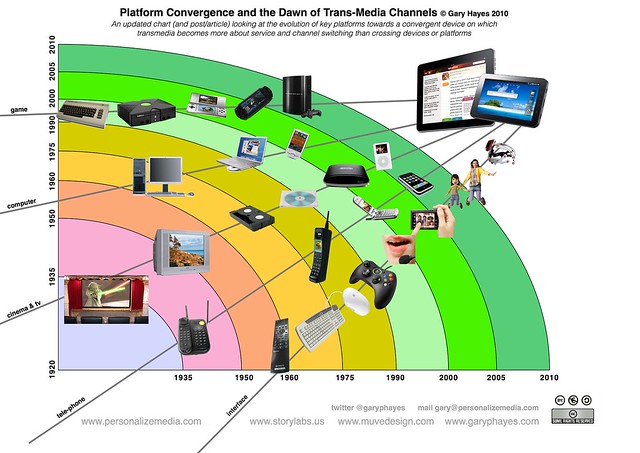Media convergence is a term for two things: 1) It is when different media merge through technology. This is also known as technological convergence. 2) It is also when companies own different media outlets as part of a business strategy. This is also called media consolidation, media concentration or economic convergence.

1) Technological Convergence
Books, newspapers, radio, television and cinema were once distinct media. They also had their own industries. Then came the shift from analog to digital. The rise of computer networking and the Internet led to the integration of all media.
Technological Convergence: The Good
It makes it easier to produce media content. It also makes it much quicker and easier to distribute that content. A digital picture, for example, can be shot and transmitted globally within seconds. Consumers can get many forms of content on one device. Sending data and products via electronic media is much more efficient. It replaces the physical movement of goods.
Digital media allows people to make and distribute their own content. Some feel this makes media more democratic. To produce and broadcast content, one only needs digital media and a computer network.
Technological Convergence: The Bad
Not everyone has ready and affordable access to digital media. Nor do all people have the skills to use them. Access to computer networks and computer literacy is vital.
Computer tracking tools have resulted in increased surveillance. This has led to concerns about privacy and security. Digital content can be copied, changed and spread with great ease. But this is a challenge for copyright law. It makes it hard to prevent the pirating of content. The music, film and television industries have been hit hard by this. Publishing has also been hurt by the free transmission of media.
2) Economic Convergence
Media convergence is also a business strategy. (It is also known as media consolidation, media concentration or economic convergence). It is a product of three elements. First, digitization. Second, corporate concentration. Fewer large companies own more media firms. And third, deregulation. These factors have allowed media companies to own different kinds of media (e.g., TV and radio stations and newspapers) in the same markets. It also allows companies that carry content to produce content.
Converged Media in Canada
Quebecor Inc. is the king of media convergence in Canada. Its media outlets cross-promote the content it makes and distributes. Quebecor is active in newspaper, magazine and book publishing. It makes and distributes TV content. It provides cable, phone and Internet services. It owns music distribution and retailing outlets. It even develops video games.
Bell Canada Enterprises (BCE) owns cable and phone networks. It owns CTV, TSN and Crave. It also owns Internet services and advertising. It holds partial stakes in the Montreal Canadiens and Maple Leaf Sports & Entertainment. (MLSE owns the Toronto Maple Leafs, Toronto Raptors, Toronto FC and Toronto Argonauts.)
Rogers Communications is Canada's largest wireless network. It has interests in Internet services, TV production and distribution, radio, and magazine publishing. It also owns the Toronto Blue Jays. Their games are broadcast on Rogers’ radio and TV networks. (See also Rogers Buys Blue Jays.)
The CBC has also changed its profile. It was once only a radio and TV broadcaster. It is now a multi-platform media provider. It offers web services, mobile news and music apps. The CBC Radio program q is broadcast on CBC TV. It also has its own web site and YouTube channel.
Economic Convergence: The Good
Corporate convergence is of great benefit to companies. It allows them to reduce the costs of labour, materials and staff. They can use the same content across several outlets. Advertisers can get package deals for many platforms. Cross-promotion and cross-selling can improve brand loyalty.
Economic Convergence: The Bad
Reduced competition can make it harder for new companies to enter the market. Media can become more commercialized. People can be treated more as consumers than citizens. Corporate mergers can also be very costly. Concerns about the quality of corporate journalism tend to increase. The independence of journalists and the range of viewpoints comes into question. Conflicts of interest can arise. And the coverage of local issues is reduced.
See also Media Ownership; Media Literacy; Media Bias in Canada; Politics and the Media; Media and the Law.

 Share on Facebook
Share on Facebook Share on X
Share on X Share by Email
Share by Email Share on Google Classroom
Share on Google Classroom




